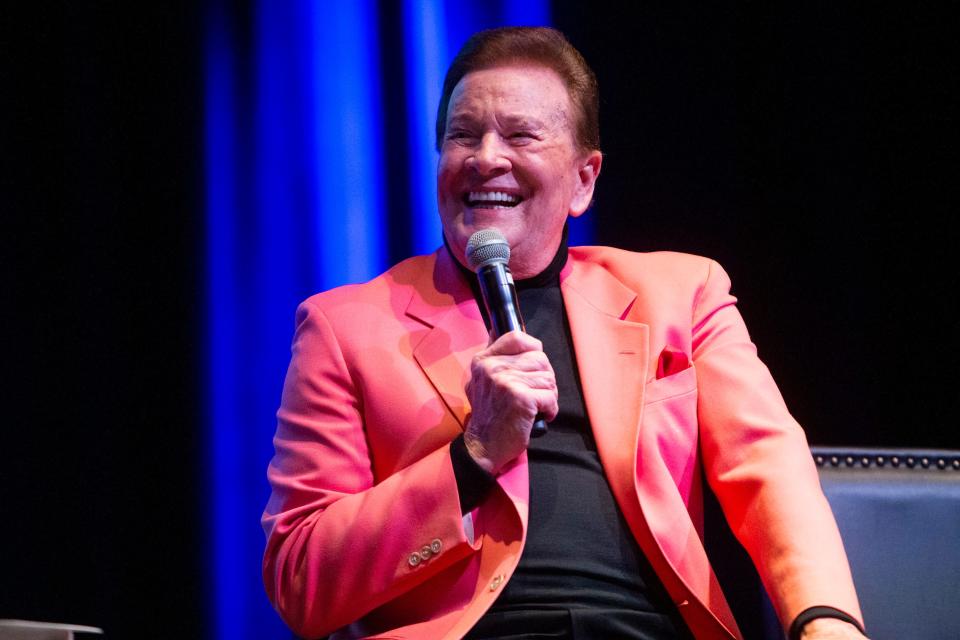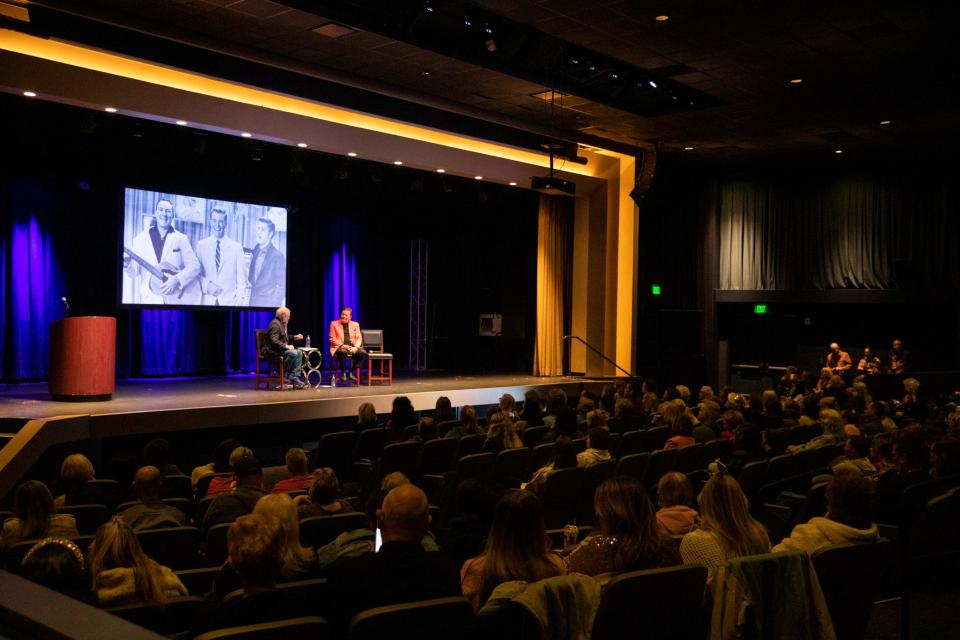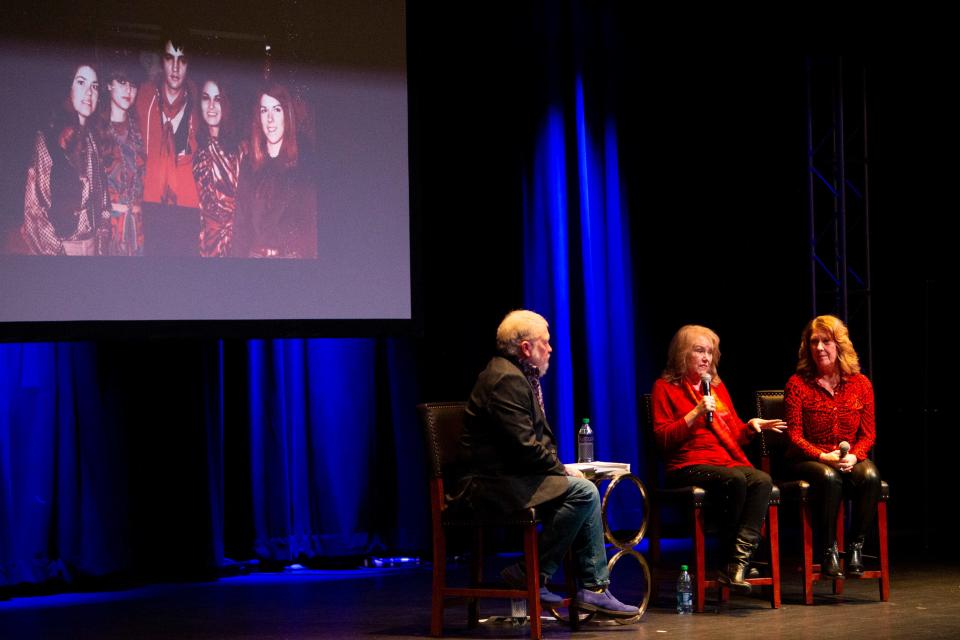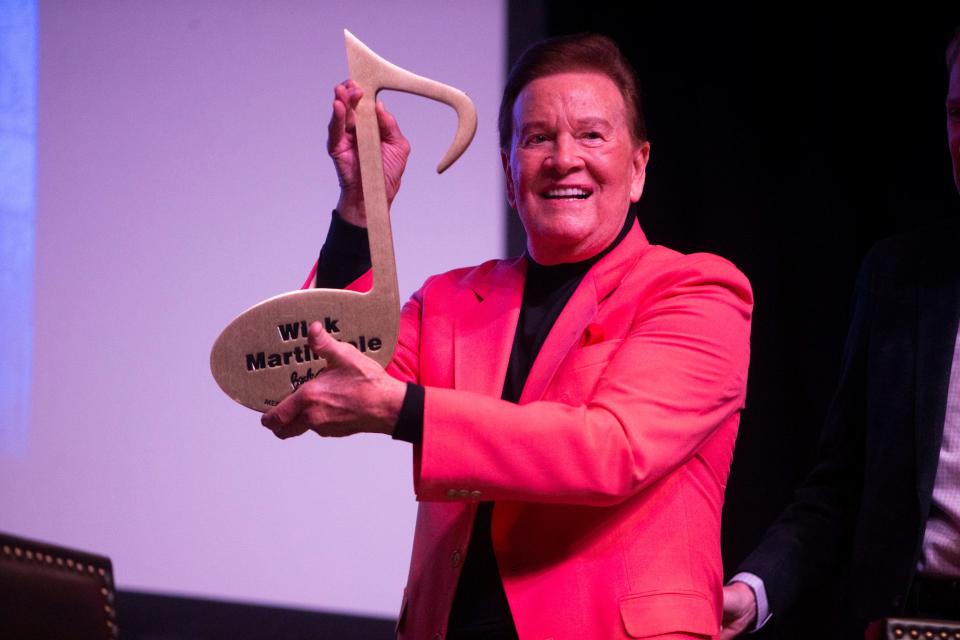Wink Martindale talks friendship with Elvis, being there for 'beginning of Presleymania'
When Dotty Summerfield first met Wink Martindale, she was 9 years old and a guest "cadet" on "Mars Patrol," a mid-1950s kiddie show that presented Martindale — with a smile as wide as his spacesuit's shoulder pads — as Memphis' version of Flash Gordon.
"We got to be on television and sit in those little airplane seats and rock back and forth," remembered Summerfield, 78, of East Memphis.
Summerfield was able to say hello to Martindale again Saturday morning at The Guest House at Graceland, where the 90-year-old Memphis "broadcast legend" and longtime national TV personality was the headliner for "Conversations on Elvis," a public talk show-style event held in the hotel's theater, as part of this week's commemoration of the Jan. 8, 1935, birthday of Elvis Presley. About 300 people attended, to hear stories about the King of Rock 'n' Roll from his friends and colleagues.

Remarkably fit and telegenically handsome at 90, with a voice almost as resonant as it was in his heyday, when he hosted such 1970s and '80s network game shows as "Gambit" and "Tic-Tac-Dough," Martindale was introduced by "Conversations" host Tom Brown (a longtime Graceland associate and former Turner Classic Movies producer) as "a broadcast legend" and "the last survivor" of the historic night that introduced Elvis Presley, the entertainer, to what would prove to be a rapt and eager world.
In other words, Wink was — to paraphrase Lin-Manuel Miranda — more or less in The Room Where It Happened on that July night in 1954 when his fellow deejay, Dewey Phillips, played Elvis' version of "That's All Right" on the air, after Sun Records founder Sam Phillips (no relation to Dewey) delivered the acetate of the recording to the WHBQ radio studio, then located in the Chisca Hotel on Main Street.
"That was the beginning of Presleymania, and I just happened to be there at night," Martindale told the "Conversations" crowd.

Martindale, a morning deejay, said he was at the station that night only because he was showing the studio to some visiting high school friends from his hometown of Jackson, Tennessee, where Winston Conrad "Wink" Martindale began his radio career before relocating to Memphis for his "dream" job on WHBQ. He said the Elvis song caused such a "commotion" that he was charged with calling Gladys and Vernon Presley at home, to get them to bring Elvis to the studio, to talk on the air about the song that was driving listeners wild.
"I met him that night, and he remained my friend until the day he died," Martindale said.
ELVIS TRIVIA: Think you know everything about the King? Try to answer these questions
After his stint on "Mars Patrol," Martindale was promoted to host the teen-oriented "Top 10 Dance Party" on WHBQ-TV, the precursor to WHBQ's long-running "Talent Party" with George Klein. In 1956, Elvis appeared on the show, for free, "much to the chagrin of Colonel Parker," who "never spoke to me again," Martindale said.
Martindale left Memphis for Los Angeles in 1959. In 1975, he married Sandy Ferra, Elvis' former girlfriend — and a friend of another of Saturday's "Conversations" guests, dancer/stuntwoman Sandra Gimpel, 84, who appeared in 15 Elvis movies; doubled for such performers as Debbie Reynolds and Susan Lucci; and portrayed the sucker-fingered "salt vampire" in "The Man Trap," a famous 1967 episode of "Star Trek."

Other speakers Saturday included drummer Gene Chrisman, one of the ace session musicians known as the "Memphis Boys" who played on the classic Elvis tracks ("Suspicious Minds," "Kentucky Rain," many more) recorded in 1969 at Chips Moman's American Sound Studio in North Memphis; Alabama sisters Mary and Ginger Holladay, who were backup singers at those sessions (and whose other credits include such hits as Jimmy Buffett's "Cheeseburger in Paradise" and Ray Stevens' "The Streak"); and Kiri Namtvedt, a sculptor who created the model of the "Lisa Marie" airplane that this year was introduced to the "Graceland" collection of "Snow Villages" produced by the Department 56 company.
Ginger Holladay — who was only 17 when she gave up cheerleading practice and her senior-year high school exams to come to Memphis and record with Elvis — said the American studio was "funky" in more ways than one. "There were rats in the ceiling," she said. "A lot of times they'd have to stop the session, and we had to wait 'til they got settled."
NOW STREAMING: 5 Elvis movies to stream in honor of the King of Rock 'n' Roll's birthday
Chrisman didn't seem to mind the rats, but he said he didn't really enjoy Elvis' similarly nocturnal hours. Presley would show up about 5 p.m., and play until about 5 the next morning. The results were priceless, but when the Elvis sessions ended after about two weeks, Chrisman said he thought: "Boy, I'm glad this is over — that's too many hours for me, boy."

Near the end of the Saturday "Conversations," which lasted about two hours, Martindale was presented with a Beale Street Walk of Fame Brass Note. The note will be added this week to the Beale Street Walk, which is modeled on the famous Hollywood Walk of Fame on Sunset Boulevard and consists of more than 200 honorees.
Martindale said he always has considered Memphis his true home. He said he was honored to be remembered for his association with the city's music in "a period that a lot of us feel was monumental — monumental — to shaping the music of a coming generation."
This article originally appeared on Memphis Commercial Appeal: Elvis birthday week: Wink Martindale talks friendship with the King
